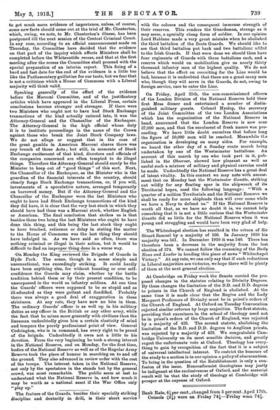Speaking generally of the effect of the evidence before the
Marconi Committee, and of the justificatory articles which have appeared in the Liberal Press, certain conclusions become stronger and stronger. If there were two Ministers who ought not to have had Stock Exchange transactions of the kind actually entered into, it was the Attorney-General and the Chancellor of the Exchequer. The Attorney-General is the high official whose duty it is to institute proceedings in the name of the Crown against those who break the Joint Stock Company laws. We do not allege or suggest that in the case of the great gamble in American Marconi shares there was any breach of those Acts ; but still, in moments of Stock Exchange excitement of that kind, directors and officials of the companies concerned are often tempted to do illegal things. Therefore the Attorney-General should surely be the Minister to keep out of " good things " of this sort. Next, the Chancellor cf the Exchequer, as the Minister who is the guardian of the financial interests of the country, should clearly forgo Stock Exchange transactions, or, if you will, investments of a speculative nature, arranged temporarily on borrowed money. But if the Attorney-General and the Chancellor of the Exchequer were the last Ministers who ought to have had Stock Exchange transactions of the kind they did have, it is clear that the very last stock in which they should have had them was a Marconi stock, whether English or American. The final conclusion that strikes us is that besides these two being the last Ministers who ought to have done this thing, and this being the last stock they ought to have touched, reticence or delay in stating the matter to the House of Commons was the last thing they should have indulged in. As we have said so often, there was nothing criminal or illegal in their action, but it would be difficult to find an improper thing done in a worse way.


















































 Previous page
Previous page